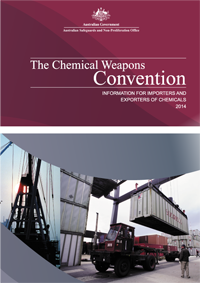Chemical Weapons
The CWC is the only international treaty with a system of verification to ban comprehensively an entire category of weapons of mass destruction. It is the principal international instrument for addressing the threat posed by chemical weapons.
The CWC bans the development, production, stockpiling, and use of chemical weapons. It provides for:
- the declaration of past chemical weapons programs, and destruction of (declared, old and abandoned) chemical weapons and any associated facilities;
- countries to declare facilities producing chemicals which could be used for chemical weapons purposes; these facilities are subject to routine inspection by the Organisation for the Prohibition of Chemical Weapons (OPCW);
- international cooperation in the face of threats of chemical weapons use;
- cooperation in the use of chemicals for peaceful purposes; and
- "challenge inspections", which nations may request if they have concerns that other States party to the Convention are not abiding by their obligations.
As at January 2019, 96 per cent of chemical weapons stockpiles declared by possessor States Parties to the CWC had been verifiably destroyed. Only four countries are not party to the CWC (Israel – a signatory, Egypt, North Korea and South Sudan).
Australia's implementation of its responsibilities under the CWC is coordinated by the Department of Foreign Affairs and Trade, including the Australian Safeguards and Non-Proliferation Office (ASNO). Australia also cooperates closely with the Organisation for the Prohibition of Chemical Weapons (OPCW) in The Hague. Australia's role as Chair of the Australia Group further strengthens the effective implementation of the CWC.



